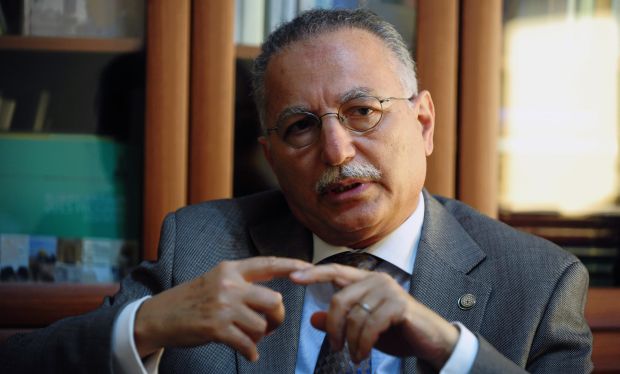
In this July 12, 2012 file photo, Ekmeleddin Ihsanoglu, Secretary-General of the Organisation of Islamic Cooperation (OIC) speaks in Istanbul, Turkey. (AP Photo/Emrah Gurel)
Samsun (northern Turkey), Asharq Al-Awsat—With just one day to go before historic presidential elections in Turkey are set to take place, opposition candidate Ekmeleddin İhsanoğlu played up his chances of overcoming election rival Recep Tayyip Erdoğan, criticizing his “exclusionary and condescending” approach.
Turks are set to head to the polls across the country on Sunday to elect the first ever Turkish president to be directly elected by voters, instead of parliament. Turkish Prime Minister Recep Tayyip Erdoğan is seeking to defeat İhsanoğlu and Kurdish candidate Selahattin Demirtaş to succeed AKP ally Abdullah Gül as the next Turkish head of state.
Before the elections, Ekmeleddin İhsanoğlu was perhaps better known in international circles than within his native Turkey. The mild-mannered scholar and academic had served as Secretary-General of the Organization of Islamic Cooperation (OIC) from 2004-14. He is backed by Turkey’s main opposition parties, who are seeking a victory over the AKP after falling short in municipal elections held earlier this year. İhsanoğlu’s election campaign has focused on unity and inclusiveness, with the former OIC chief—who was born and raised in Cairo and speaks fluent Arabic—seeking to entice AKP voters away from the fold.
Asharq Al-Awsat: Many were surprised by your nomination for the Turkish presidential elections. How did you make the decision?
Ekmeleddin İhsanoğlu: I was nominated by two opposition parties in the Turkish parliament, the Republican People’s Party (CHP) and the Nationalist Movement Party (MHP). As you know there are four main parties in the Turkish parliament: the ruling AKP which has nominated [Prime Minister] Mr. Recep Tayyip Erdoğan, the Kurdish People’s Democratic Party (HDP) which has nominated Mr. Selahattin Demirtaş and the CHP and MHP who have decided to back a single candidate. After they agreed on my name, the leaders of the two parties contacted me to ask for my approval and I accepted the nomination which was announced on June 14. More importantly, more than 12 political parties outside of parliament—who have millions of supporters across Turkey—have all agreed to endorse me as a consensus candidate representing the Turkish people of all sects and stripes.
Q: How do you assess the reception of your nomination?
There has been huge support, not only from political leaders, but also from the general public. The 14 parties that officially support me represent a large proportion of the Turkish people . . .who want a president who represents everyone.
Q: What about those who say that the president in Turkey does not enjoy broad-ranging powers? Would you agree with this assessment?
That is true. The president of the republic has limited powers. But the importance of the head of the state lies in the fact that he constitutes a safety valve and represents the entire Turkish people. The president must be politically neutral and not be party to any political disputes. Mr. Erdoğan’s approach is one of challenge and political polarization. It is this approach that brought him to power [as prime minister] because the election system unfortunately gives the winning party too many seats . . .while neglecting the other half of the Turkish people.
Q: CHP presents itself as the main secular party on the Turkish political scene, while MHP promotes its “nationalist” political orientation. Why did these two opposition parties choose to nominate a conservative politician such as yourself, particularly considering your previous role with the OIC?
This is something to be appreciated [as it reflects] the development of the Turkish political thought and it represents a step forward. When you say that the CHP had such and such origins but its stances now are such and such, this means that the party has evolved and has become in harmony with the wishes of the Turkish people. The same applies to the MHP. In other words, the horizons of these two parties are now broader than they used to be. Both parties are seeking to get closer to the heart of the Turkish people who believe in conservative values and traditions and believe in Islam as a religion and [a source of] morality. This development reflects the convergence taking place among the Turkish people. During my election campaign, I have noticed [increasing] harmony among the Turkish people across the [political] spectrum. The former antagonism and sensitivities have started to diminish, which is a good thing. It is a [natural] response to the prime minister’s exclusionary and condescending approach which is intolerant to others.
Q: When you took the decision to stand for president, did you consider that this would bring you into confrontation with Prime Minister Erdoğan?
The opposition parties and a large group of parties from outside the parliament want an alternative [to Erdoğan] and they agreed that I would be that alternative. The Turkish people have the right to have an alternative. Elections without alternative [candidates] are undemocratic.
Mr. Erdoğan came through a democratic process which should continue. Democracy does not begin and end with one person.
